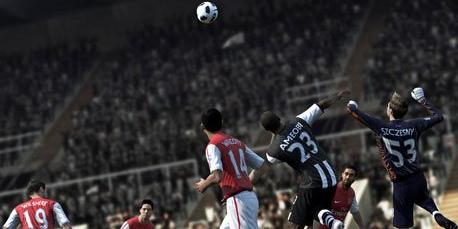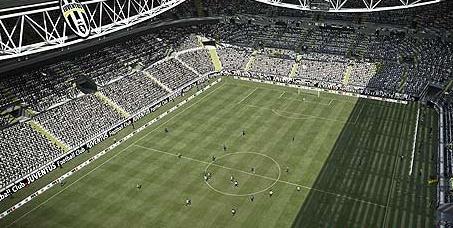翻译内容放在前面吧:
关于第一段, 说了一通废话,笔者试玩了一天, 最后一句供参考,此作和前作比有很大不同。
关于冲击系统,笔者将冲击系统解释了一遍,然后表示很有趣,举了个例子,在用喜鹊对热刺比赛中,健壮如牛Barton把Bale撞的打转(那种很真实的趔趄),在草皮上就像碰撞测试的假人(可能翻译的很生涩)肌肉男Balotelli 可以靠身体挤过包围他的防守队员,扭打,拉扯衣服等细节;真实的物理系统带来的巨大风险,例如一个抢断会给对方带来混乱,也可能对本方带来混乱,甚至对本方其他队员会带来混乱,球在很多腿中间到处蹦跳,而且不光在有球状态下,在无球跑动过程中队员会撞上对方,纠结在一起,推搡,拌人,在球场内充满了各种全武行。
然而该冲撞系统比较真实,极其的搞笑,比如滑铲会把球捅向进攻队员,然后很爽的弹回到他的进攻方向等(例举了很多情况,不在这里废话)这些情况会偶尔发生在FIFA11里面,但是是有限度,有规律的, 但在新作里面偶然性非常大,这一点很让人期待。
谈到精确带球系统,笔者表示这里面有很多值得去探索的,由于有这些操控使得比赛的过程有很多不确定性,多变,比如左摇杆(看来此作为键盘党的终结)的使用,精确带球系统给左摇引入一个节奏变化设置,比如在一个方向上慢速带球然后突然加速改变方向,加速;LB键为手动精确带球而配置,它的使用将会带来非常精确的方向控制,比如带球绕圈,护球,拦截等
让人期待的部分来:游戏建立在一个有节奏的控制基础上,你并不是满场飞奔(疯狂的强逼围可以歇菜了),而是围绕着速度在游戏,时而慢速带球,时而加速突破,例如你在操控梅西(当然也许是其他球员),当你接近防守队员的时候,不按任何键,会自动进入一个精确带球模式,Rutter将其视为该设计中的核心部分,他解释道,在开阔地带加速突破是理所当然的,在面对很多防守队员时也是需要微操的,这都是在有球情况下的2个功夫,和以前的FIFA比,在这里里面给你去充分的发挥想象力和真实性的空间(让人浮想联翩)。
谈到防守,在新的控制设置里面可以定义某个键从而实现针对某个对方球员施展压迫,保持你的位置,然后在对方球员往边线赶,基本概念是不让对方拿球队员做他想做的,而是迫使他犯错,而这些错误让防守方有机会去抢断,在这一点上,技巧就显得很重要了,因为这次是手动抢断(按住某个键不放将成为历史),比如用操控一个球员,然后呼叫第二的球员上来围堵,然后操控球员上去封堵传球线路,射门路线,或者等待对手犯错
对这个游戏接触越久,越能理解新作。就像一个真实的球员哪样,并不是一味的试图去抢断,而是等待对方出错的时候再做决定
以上是针对游戏性的一些翻译(仅供参考),对于经理模式就不翻了, 好累! 谢谢观赏!
===============================
Fifa 12 hands-on preview
We spend a whole day with the latest Fifa extravaganza – and find much to enjoy in its trinity of major gameplay overhauls

Fifa 12 ... and they have the cheek to call Australian Rules football 'aerial ping pong'?
The makers of football sims would like us to believe that every annual iteration is a radical improvement on the last. In a minority of cases, this is actually true.
The brief glimpse we caught of Fifa 12 during E3 suggested that this could be one of those occasions. Producer David Rutter is pushing a trinity of major changes to this year's instalment: a new player impact engine, a re-designed tactical defending system and precision dribbling. Having spent a whole day playing the game at EA's Guildford offices, it seems to me this is much more than PR bluster. This is a very different game to Fifa 11.
The player impact engine is the most immediately visible – and strikingly entertaining – of the game's new additions. An advanced procedural animation system tied with accurate collision physics, means that every encounter between players is calculated in real-time – and they all seem to look and end differently, depending on the physical forces and sheer bulk of the men involved.
In one game between Newcastle and Spurs, for example, a typically robust Barton tackle sends Bale spinning – literally spinning – across the turf like a crash test dummy. Physical altercations have real crunch to them; muscular forwards like Balotelli are able to barge through defenders, their bodies clattering and shoving, shirts tugged amid the tussle.
But the real physics seems to mean real risk. A tackle may upend the opposing player, or the tackler himself may come out badly, splaying awkwardly to upend an incoming team mate. You get these brilliant goalmouth scrambles as frantic players pile in, the ball ricocheting realistically between multiple sets of limbs.
And this physicality is not just confined to on-the-ball moments: you'll often see background crunches where players have simply run into each other, sending someone spiralling to the ground in the near distance. Everywhere, there are players scrambling, jostling and tripping. The pitch is crammed with action.
The impact engine, then, is authentic, often thoroughly amusing, but also a potential game changer. Fifa fans who have learned to predict the baked in behaviours of the ball and players will be quite literally wrong-footed again and again. Sliding tackles now often poke the ball against the oncoming attacker, rebounding it deliciously into his path; perfectly weighted through balls can clip the ankles of stranded defenders, knocking them agonisingly off course.
This sort of thing did occasionally happen in Fifa 11, but it was within a more structured, more synthetic system. Here, quirky interventions and unexpected rebounds seem to be a factor in every encounter – and it's thrilling stuff.
But it seems that there's plenty of skill and deftness to discover in the new controls, balancing out the blood and thunder. The game flow feels much more varied. The overhauled precision dribbling system puts a pace control option on the left trigger, which drops you down to a tightly controlled jog.
From here, you can easily sell the ball in one direction and accelerate off in the other. Then, the top left bumper button is for manual precision dribbling, which gives high-fidelity control over direction, allowing you to circle the ball, guard it, and hold up play. "We were umm-ing and ahh-ing about whether to keep that feature in, " says Rutter. "But I suspect it won't get cut because it's too much fun."

The result is a game that is more analogue in terms of pace; you're not just sprinting everywhere (was that just me?), you're playing around with speed, you're slowing, then accelerating, you're Lionel Messi. (And even if you're clearly not Messi, when you approach a defender with no buttons pressed, it'll drop you into precision control automatically. The system wants you to play well.)
Rutter saw this as a key aim of the design process. "Yes, there's a time for sprinting, when there's a wide open space, but there's also a time for close control when you're in congested areas – and both are important weapons when you have the ball, and allow you to express yourself with much more fidelity and imagination than previous versions of Fifa. That's not to say they're over-powered, and I think that's an important qualification."
Meanwhile in defence, the new control set-up includes jockeying options on the triggers that let you put pressure on an opposition player. But there's also a tactical defending button that's more about holding your position and gently guiding an incoming player into the sidelines where they can't do any damage.
"At a base level it's about containing, not letting that player do what he wants to do until you force him into an error," says Rutter. "One of those errors is showing the ball to you, allowing you to tackle him – at that point it becomes very much about skill, because it's a manual button press to tackle. I tend to use the jockey buttons to drop a player into a sort of free-ranging contained state and then use the top right button to bring in a second defender if necessary. He would then apply normal contained pressure and I can move my other player with full manual control to try and cut out a pass or shot and wait for my opponent to make a mistake.
"The more adept you get, the more you understand that, 'okay, what I'm doing here is not necessarily trying to tackle, what I'm doing is waiting and holding until play breaks down.' That's what real players do."
Beyond the match engine, another key aim with Fifa 12 has been to add depth to the Career mode, which was introduced last year. As a manager you'll have to cope with genuine injuries, attained through the physics-led collision system.
Putting unfit super stars into your first 11 becomes a tactical option, but also a huge gamble – not just because they could get crocked again, but because of the effect it might have on your relationship. Player psychology and media intervention are much bigger deals in this game – aping, perhaps, the changes that have **ised the Football Manager series over the past few years.
The newspapers will hungrily pick up on injuries, player resentment, any whiff of a potential exclusive – and if you don't deal well with your squad's problems, they'll huff off to the tabloids quicker than you can say 'transfer gossip'.
"We've put a big focus on be a manager in the sense that if it can happen in the real world, it can happen in the game," says Rutter. "Last year, the 'Play as Manager' mode was very blinkered, it was just about you. This year, curve balls will be thrown. Your players might become unhappy because they don't think they're being paid enough, because the team's not successful enough, or they're not getting enough run outs on the pitch.
"If they become unhappy, their form dips; if they come and talk to you about it and you don't do enough, they'll talk to the press. And when they talk to the press, other managers within the game might try and sign them. Basically. things unfold that are outside of your control – things come to you. It's a very different experience."
Apparently, the transfer AI is a lot more cunning too. Transfer targets will chance extravagant wage demands to test your resolve; other clubs will put in pitiful offers for your star striker. Everyone's on the make. Thankfully, though, there's also an improved youth scouting facility, so you can bypass predatory clubs and mercenary players and discover the next Jack Wilshere for yourself.
All clubs have season expectations, which the press and match commentators (Alan Smith and Martin Tyler) pick up on. There is also an extended transfer deadline day feature, which provides tons of last-minute business, a news feed of the latest in-game deals, and a ticking countdown clock to replicate the excitement of those last few hours of negotiations. In the midst of the chaos, your Chief Executive will provide helpful hints on possible buys, and you're able to stall on deals until the last few moments of the day to see how other business pans out.
Another fresh addition is the EA Sports Football club, essentially a social networking feature similar to Autolog and Battleog. Everything you do in the game, from winning tournaments to triumphing in Career mode earns you XP which filters into online leaderboards, both worldwide and friend-based.
You're constantly kept up to date with what your mates have achieved in the game, and can also spam your own successes to your Facebook account. Elsewhere, a Challenge section, which offers themed match experiences based around recent real-world football matches – so if Chelsea just beat Sunderland with a second-half hat-trick from Drogba, a challenge might be to play the last half as the Black Cats and try to prevent the assault.
As an extra motivator, participants get to align themselves with a favourite club, which then gets a share of all their XP wins – this is all averaged out to create a score and a league table reflects the weekly fortunes of all the real-world sides. I'm not sure how much all this will mean to the average Fifa player – I just want something like Autolog, that makes it easier for me to complete against friends online, either together or asynchronously.
So far then, Fifa 12 looks to be ushering in a very interesting new era for the series – one of complexity and unpredictability, both on and off the pitch. Interestingly, although it seemed to me that the player impact engine was the most obvious of the three major innovations.
Rutter – who is on a something of a global press tour with the game – told me that different aspects are noticed much more in different territories. "Precision dribbling was a very big deal to the North Americans," he says. "Tactical defending was important too because it took a lot of the pressure off them. In the UK, we're talking more about the player impact engine – I'm off to France and Italy and Spain later this week and I'm sure they've all got their own take on what's important."
I guess that's the important thing with modern football simulations. Just like current fighting games or all those military shooters with their myriad load-outs and perk options, personalisation and individual expression are the key. Plus, anything that gets us further away from pre-cooked animation cycles, unresponsive team mates and defensive options that stop at "sliding tackle or foot prod" is a triumph, really.
|
(本文由足球吧编辑) |
 设为首页
设为首页 加入收藏
加入收藏
 收藏文章
收藏文章 回到顶部
回到顶部